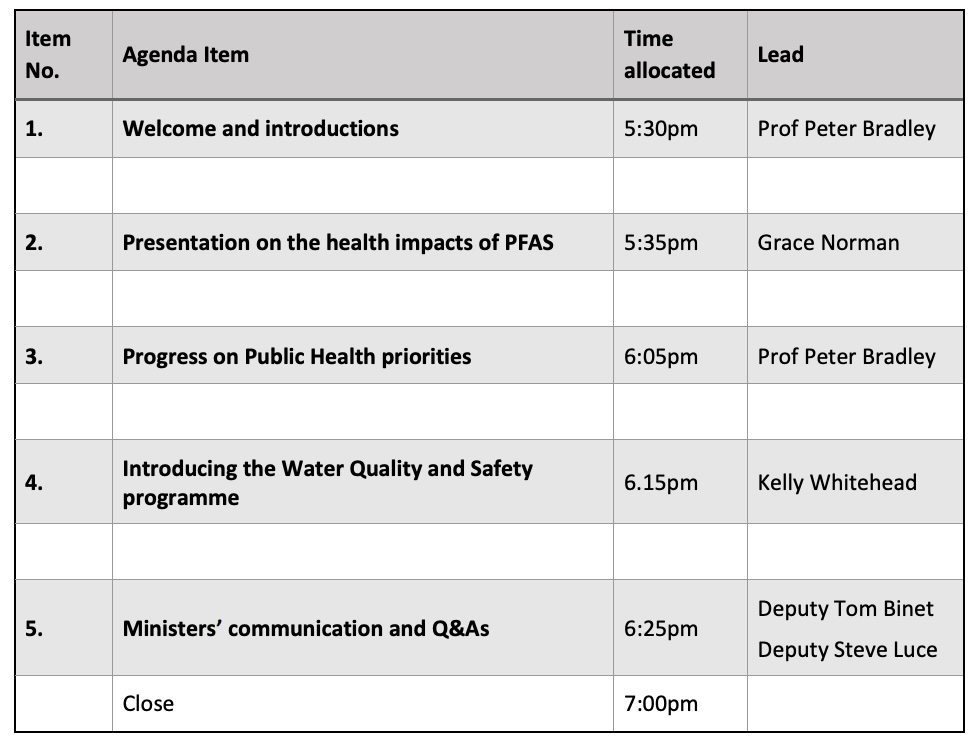


Islanders concerned about the impact of a chemical present in water in Jersey are being invited to a meeting after an expert panel published a set of papers explaining the potential negative health impacts.
Taking place tonight (Tuesday 26 November) in St Peter, the meeting is primarily for islanders who live or lived in the area around the Airport and have been affected by or are concerned about ‘PFAS’.
Tonight's meeting will present the final report following a period of public feedback, which finished last month.
The Government will also give its response to the proposed recommendations.
PFAS, or Perfluoroalkyl and polyfluoroalkyl substances, is a family of thousands of manmade chemicals, some of which are present in high concentrations in some parts of the island. PFAS is also evident in trace amounts in mains drinking water.
The principal source of contamination in Jersey was firefighting foam sprayed at the Airport, which entered the water course and permeated down into St Ouen's Bay and the Pont Marquet valley, which runs from the Airport to St Aubin's Harbour.

Pictured: The issue of PFAS present in water in Jersey has largely been brought to the fore by campaigner Sarah Simon, who lives in the affected area.
In response to the concerns of islanders, the Government funded a blood-testing programme in 2022, which showed that half of those tested had high levels in their bodies, and established an independent 'Scientific Advisory Panel' to make recommendations on what ministers should do.
The panel published a draft of their second of five reports in September, which assessed the health impacts of exposure to PFAS.
Its report concluded that there was a "consistent association" between exposure to certain types of PFAS and elevated cholesterol, particularly 'bad' cholesterol.
It also found that "there is evidence suggesting a probable increase in the incidence of kidney and testicular cancers among populations exposed to certain cancers".
It added: "The panel also noted some evidence indicating an increased risk of bladder cancer, though this was less clear.
"In contrast, common cancers such as breast, colon, and prostate cancers did not show a significant increase in incidence across the most relevant research studies, providing some reassurance. Nevertheless, a link not having been clearly found does not mean that a link is not there."
The panel found "inconsistent" evidence of a link between PFAS exposure and endocrine disorders, such as thyroid dysfunction, obesity and type 2 diabetes.
When it came to reproductive health, the panel concluded: "Overall, the panel was not persuaded that PFAS exposure has been demonstrated to have impacts on most reproductive health outcomes, except for some evidence pointing to challenges with breastfeeding.
"They strongly recommended that mothers, even those exposed to PFAS, should breastfeed, emphasising that the considerable benefits are likely to outweigh any potential risks from PFAS transfer during breastfeeding."
Its recommendations included that PFAS-exposed islanders found to have elevated cholesterol in their blood should have it managed in the usual way, through diet and statins etc.
It also recommended that when PFAS-exposed people exhibit symptoms which are consistent with kidney cancer, testicular cancer or bladder cancer, clinicians should have a "higher level of suspicion of cancer than in unexposed populations".
Other recommendations included:
Where a person is at increased risk of osteoporosis and is also PFAS-exposed, clinicians should consider a lower threshold for investigating whether osteoporosis is present.
People who live in communities with increased PFAS exposure should be offered access to talking therapies to support their psychological health and wellbeing.
A health professional with particular expertise in PFAS and health should be made available to clinicians in Jersey to offer technical support in caring for PFAS-exposed patients.
A "concise knowledge-based resource" on PFAS exposure and health should be made available to the public and health professionals in Jersey.
The panel's first report recommended that the Government offer a programme of "therapeutic phlebotomy" – or blood-letting – for residents with high levels of PFAS in their blood.
All its recommendations were accepted by the Government, which is currently setting up a therapeutic phlebotomy service for islanders.
Campaigner Sarah Simon questioned whether the recommendations went far enough, however, telling Express at the time that she felt that it should be acknowledged that exposure to PFAS isn't just historic, but an ongoing issue in her view.
Tonight's meeting will take place between 17:30 and 19:00 at the Les Ormes Function Room.
At the meeting, Public Health will present their findings on the health impacts of PFAS from the PFAS panel's second report, 'An Assessment of the Impact on PFAS Exposure on Health'.

Pictured: The agenda for the meeting.
There will then be an update for islanders on the priorities for Public Health in responding to the findings.
Health Minister Tom Binet and Environment Minister Steve Luce will follow with an update on political progress, which will be followed by a series of questions.
While the meeting is for St Peter residents, anyone can attend, and those who want to go should email publichealth@gov.je to get more details.
Doctor appointed Gov's lead adviser on toxic chemical in water supply
Gov identify experts to recommend action on toxic chemical in water
Comments
Comments on this story express the views of the commentator only, not Bailiwick Publishing. We are unable to guarantee the accuracy of any of those comments.